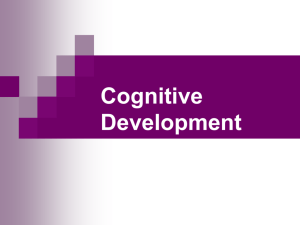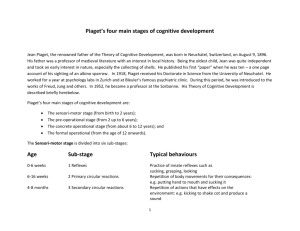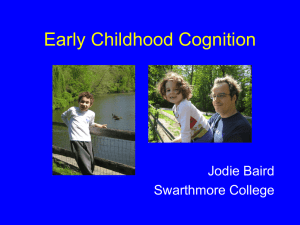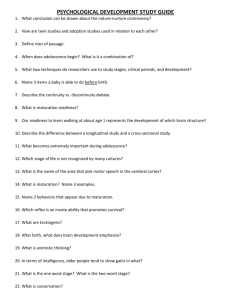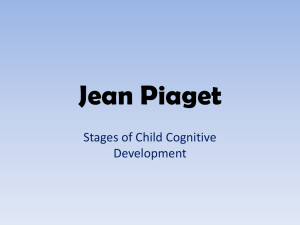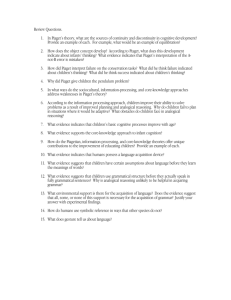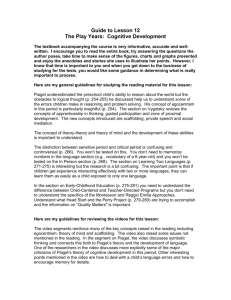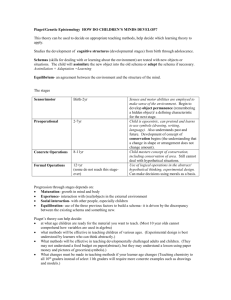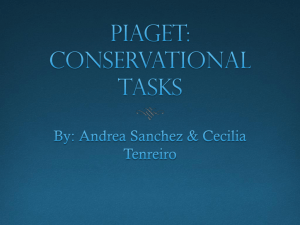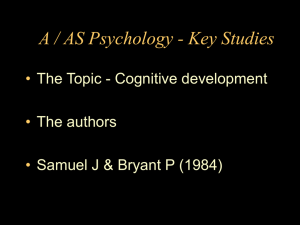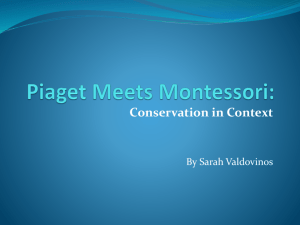Piaget's Cognitive Development
advertisement
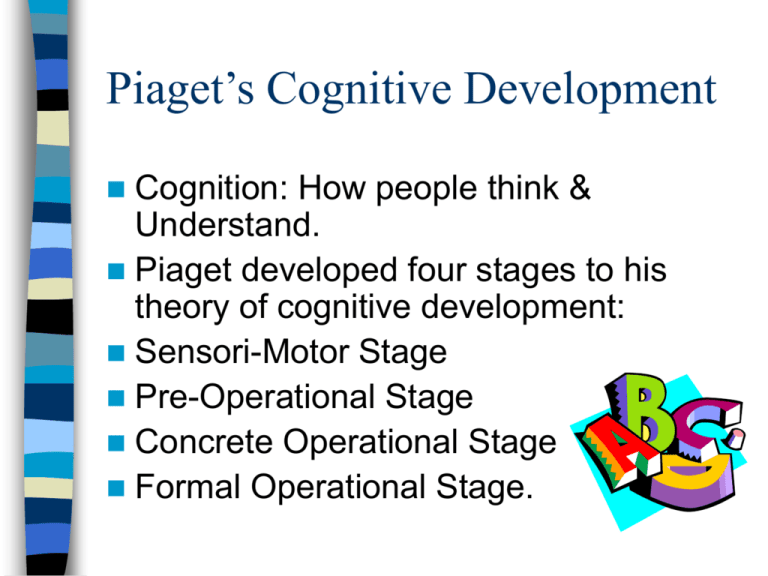
Piaget’s Cognitive Development Cognition: How people think & Understand. Piaget developed four stages to his theory of cognitive development: Sensori-Motor Stage Pre-Operational Stage Concrete Operational Stage Formal Operational Stage. Sensori-Motor Stage (0-2 years) Sensory contact understanding. The child explores the world surrounding them using it’s senses Initially sucking/grasping reflex and moving onto reaching for objects out of reach. Object permanence……… Major development within this stage. Initially the baby cannot understand a object exists out of sight. As the baby reaches around 7/8 months a child will begin to understand the object/person still exists when out of sight. Pre-Operational stage(2-7yrs old) Toddler can understand the use of symbols and language. This is an example of symbolic thinking. I.E pretend play. Language is now understood. Development of…….. Animism…child understands ‘bad table’, believes inanimate objects have feelings as they do. Egocentricism…Can only see the world from their own point of view All these developments take place in the Pre-Operational Stage. http://condor.depaul.edu/~lcamras/demotxt.htm (Example of object permanence) 8 Preoperational Stage (2 to 7 years) •"Operation" - Forms of mental action through which older children solve problems and reason logically •Key feature of stage is extensive representation •Pre-op kids develop “theory of mind” (understanding of mental processes) Limits of preoperational stage •Still very egocentric –Mountain task QUESTIONS WHY CAN’T CHILDREN IN PIAGET’S PREOPERATIONAL STAGE CONSERVE? CAN CHILDREN IN THIS STAGE BE TAUGHT TO CONSERVE? Concrete Operational Stage (7-11 years) The children are now able to conserve, They understand that although the appearance has changed the thing it self does not. What is CONSERVATION? “the awareness that a quantity remains the same despite a change in its appearance” = Make sure that the children do not fail to conserve because they do not understand the terms used in the questions- Piaget has been criticized for using difficult questions. Do you have more blocks or do I have more blocks or do we have the same amount of blocks? Critical Research... Blank & Rose (1974) The way in which the question is asked is important, when they replicated Piaget experiment the percentage of 6-year olds that could conserve increased. McGarrigle & Donaldson (1974)’Naughty teddy’(hand puppet) messed up the counters instead of the experimenter, they found that again more 4-6 year olds could conserve. Formal Operational Stage years ) (11- 16 Most of previous characteristics discussed have now developed. The child shows logical thinking and is able to work through abstract problems and use logic without the presence of concrete manipulation. E.g. If Kelly is taller than John and John is taller than Pete who is the tallest? This is an example of inferential reasoning. Inductive reasoning Example: Pendulum problem •Formal operational children will systematically test all possibilities before arriving at a conclusion How fast? Summary of Piaget: Criticisms Underestimated the importance of knowledge Gagne: Complex skills can be acquired easily once simpler prerequisite skills have been learned. Development is based on LEARNING new skills - continuous not discontinuous. Underestimated the ability of children . Tasks were methodologically flawed Underestimated the impact of CULTURE: Piaget’s tasks are culturally biased Schooling and literacy affect rates of development Summary of Piaget: Criticisms Demand characteristics:- the children may have wanted to please the experimenter therefore changing their behaviour. Social setting:-Piaget ignored the effect of the social setting upon the child.The way adults use language and gestures. Strengths •Active rather than passive view of the child. •Revealed important invariants in cognitive development. •Errors informative. •Perceptual-motor learning rather than language important for development. •Tasks. In Summary……. •Piaget’s theory is wide-ranging and influential. •Source of continued controversy. •People continue to address many of the questions he raised, but using different methods and concepts. Sample Questions.... Describe the role of accommodation in the development of schema (3) What is meant by ‘conservation’? (2) Use your knowledge of psychology to discuss research into children’s ability to conserve. (8)
